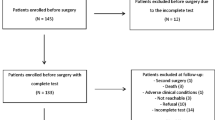Abstract
There is a need for valid objective tests of neurological improvement or deterioration to more accurately define response or progression in phase II studies of malignant glioma. The Edinburgh Functional Impairment Tests (EFIT) incorporate objective measures of upper and lower limb function, memory and a rating scale for dysphasia. We examined the intra-observer repeatability of the (EFIT) 24 hours apart in 55 patients with brain tumors and stable neurological disease and the inter-rater repeatability in 33 patients in the peri-operative period (54 dual assessments).
Intra-observer studies of the four subtests, failed to demonstrate any learning effect and showed close agreement. Inter-rater studies were affected by a treatment effect (steroids) and identified slight inter-rater bias for the ten meter walk. Altman-Bland plots showed that the level of agreement was less good in patients with more severe impairment. Correction for the severity of handicap was possible using a simple formulae: (timed tests: [rater 1 − rater 2]/[rater 1 + rater 2], Williams Delayed Recall Test [WDRT] (rater 1 − 2/81). Using this correction, all intra- and inter-rater variance of patients tested within 12 hours were < 0.2.
A change of ≥ 0.2 for the timed tests and WDRT, and a change in dysphasia score of ≥ 2, represent a significant change in impairment using the EFIT. The EFIT should be a useful addition in phase II studies where objectively recording response or time to progression is important.
Similar content being viewed by others
References
Grant RG, Slattery J, Gregor A, Whittle IR: Recording neurological impairment in clinical trials of glioma. J Neuro-Oncol 19: 37–49, 1994
Macdonald DR, Cascino TL, Schold SC, Cairncross JG: Response criteria for phase II studies of supratentorial malignant glioma. J Clin Oncol 8(7): 1277–1280, 1990
Gregor A, Rampling R, Aapro M et al.: Phase II study of tauromustine in malignant glioma. Eur J Cancer 28(12): 1959–1962, 1992
Grant R: There is a direct relationship between impairments of limb function, language, memory and handicap in patients with glioma. J Neuro-Oncol 21(1): 23, 1994 (Abstract)
Wade DT: Measurement in Neurological Rehabilitation. Oxford Medical Publications, Oxford University Press, Oxford, 1992, Ch 15
Williams M: The measurement of memory in clinical practice. Br J Clin Psychol 7: 19–34, 1968
Boston Diagnostic Aphasia Examination Booklet: Les and Febiger, 600 South Washington Square, Philadelphia, PA 19106, USA
Heller A, Wade DT, Wood VA, Sunderland A: Arm function after stroke: measurement and recovery over the first three months. J Neurol Neurosurg Psychiat 50: 714–719, 1987
Goodkin DE, Hertsgaard D, Seminary J: Upper extremity function in multiple sclerosis: improving assessment sensitivity with box and block and nine hole peg tests. Arch Phys Med Rehab 69(10): 850–854, 1988
Clyde Z, Grant R: Simple objective tests of limb function and memory are valuable in assessing patients with brain tumors. Neurol 46(2): 1996 (Abstract 321)
Mahoney FI, Barthel DW: Functional evaluation: The Barthel index. Rehabilitation 14: 61–65, 1965
Karnofsky D, Burchonal JH: Clinical evaluation of chemotherapeutic agents in cancer. In: Macleod CM (ed) Evaluation of Chemotherapy Agents. Symposium, Microbiology Section, New York Academy of Medicine, Columbia University, New York, NY, 1949, pp 191–205
Rankin J: Cerebrovascular accidents in patients over the age of sixty: II Prognosis. Scot Med J 2: 200–215, 1957
Bamford JM, Sandercock PAG, Warlow CP, Slattery J: Inter-observer agreement for the assessment of handicap in stroke patients. Stroke 20: 208, 1989
Bland JM, Altman DG: Statistical methods for assessing agreement between two methods of clinical measurement. Lancet i: 307–310, 1986
Altman DG, Bland JM: Measurement in medicine: the analysis of method comparison studies. Statistician 32: 307–310, 1983
Brennan P, Silman A: Statistical methods for assessing observer variability in clinical measures. Br Med J 304: 1491–1494, 1992
Walker MD, Green SB, Byar DP et al.: Randomised comparison of radiotherapy and nitrosoureas for the treatment of malignant glioma after surgery. N Engl J Med 303: 1323–1329, 1980
Walker MD, Alexander E, Hunt WE et al.: Evaluation of BCNU and/or radiotherapy in the treatment of anaplastic gliomas. J Neurosurg 49: 333–343, 1978
Hutchinson TA, Boyd NF, Feinstein AR: Scientific problems in clinical scales as demonstrated by the Karnofsky Index of performance status. J Chronic Dis 32: 661–666, 1979
Yates JW, Chalmers B, McKegney P: Evaluation of patients with advanced cancer using the Karnofsky Performance Scale. Cancer 45: 2220–2224, 1980
Gregor A, Barton T, Downing G, Hadley D, Grant R: Comparison of neurological impairment and radiological assessments in predieting early outcome in recurrent malignant glioma patients following intra-venous RMP-7 and Carbplatin Treatment. American Association for Cancer Research Special Conference in Cancer Research, San Diego, California, June 1997 (Abstract)
Author information
Authors and Affiliations
Rights and permissions
About this article
Cite this article
Clyde, Z., Chataway, S.J., Signorini, D. et al. Significant change in tests of neurological impairment in patients with brain tumours. J Neurooncol 39, 81–90 (1998). https://doi.org/10.1023/A:1005950003774
Issue Date:
DOI: https://doi.org/10.1023/A:1005950003774




